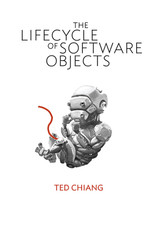What’s the best way to create artificial intelligence? In 1950, Alan Turing wrote, “Many people think that a very abstract activity, like the playing of chess, would be best. It can also be maintained that it is best to provide the machine with the best sense organs that money can buy, and then teach it to understand and speak English. This process could follow the normal teaching of a child. Things would be pointed out and named, etc. Again I do not know what the right answer is, but I think both approaches should be tried.”
The first approach has been tried many times in both science fiction and reality. In this new novella, at over 30,000 words, his longest work to date, Ted Chiang offers a detailed imagining of how the second approach might work within the contemporary landscape of startup companies, massively-multiplayer online gaming, and open-source software. It’s a story of two people and the artificial intelligences they helped create, following them for more than a decade as they deal with the upgrades and obsolescence that are inevitable in the world of software. At the same time, it’s an examination of the difference between processing power and intelligence, and of what it means to have a real relationship with an artificial entity.
Please note that The Lifecycle of Software Objects will be illustrated and printed in two colors throughout.
Limited: 400 signed numbered cloth bound copies with two-color foil stamping
Trade: Fully cloth bound hardcover copies
From Publishers Weekly (Signature Review by Charles Stross):
“The life cycle of the software objects in question is viewed through the prism of the human protagonists' own life cycle, and this skeleton is the armature on which hangs that very rare thing: a science fictional novel of ideas that delivers a real human impact.”
From Booklist:
“Chiang pares exposition and ethical reflection to the bone, without reducing an affecting story to an arid fable.”
From Locus:
“…[The Lifecycle of Software Objects] joins “Story of Your Life” and a handful of other tales which remind us that Chiang can write as movingly about characters as about ideas.”
From Tor.com:
“This is a descriptive work of science fiction, rather than a strongly plot-driven one. It’s meditative and thoughtful, and it does not offer tidy closure or resolution: just a series of ever-more-complicated questions… Very nice work indeed.”
From SFRevu:
“…you will enjoy The Lifecycle of Software Objects. ‘But it’s just a game!’ you exclaim. No, it’s a slippery slope, and Chiang will show you just how slippery. The next question is, does it matter?”
- artists_list:
- Christian Pierce
- authors_list:
- Ted Chiang
- book_case:
- None
- book_length:
- 151 pages
- book_type:
- Novella
- country_of_manufacturer:
- United States
- isbn:
- 978-1-59606-317-4
- is_subpress:
- Yes
- print_status:
- Out of Print
- year:
- 2011


